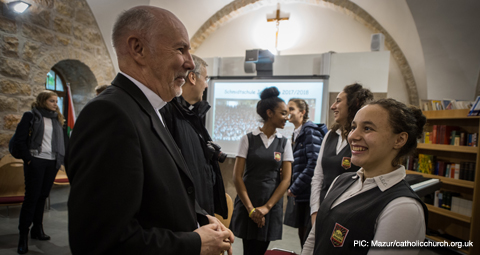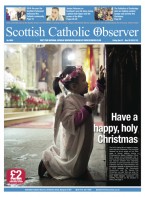BY Amanda Connelly | February 9 2018 | ![]() 0 COMMENTS
0 COMMENTS ![]() print
print

Don’t forget Christians in the Holy Land, bishop urges
Publication Date: 2018-02-09
Bishop William Nolan calls for more Scottish pilgrimages to the Middle East
A Scottish bishop has warned that the Holy Land is in danger of becoming a ‘kind of museum’ if we don’t visit Christian communities and give them our support.
Bishop William Nolan of Galloway Diocese visited the Holy Land with a group of international Catholic bishops, known as the Holy Land Coordination, in January. He encouraged Scottish Catholics to go on pilgrimage to the Holy Land, warning of an exodus of Christians from the region.
Noting the rising number of Christians and Catholics leaving the Holy Land due to a lack of work and job prospects, he spoke of the desire not to have the Holy Land become a ‘kind of museum for us as holy places.’
Pilgrimage
“Jobs and housing: those are the two areas where the Church helps out a lot but you can only create so many jobs for people,” the bishop said. “We would encourage people also not just to pray for the Christians of the Holy Land, but also to go there as well, to go there on pilgrimage and when you go on pilgrimage, to think about giving custom to the Christians who are there.
“When you go to the Holy Land don’t just go and visit the holy shrines, also visit the local Christian community as well and let them know that you’re thinking of them, you’re praying for them and you’ve not forgot about them.
“That’s one of the reasons why this group of bishops go out every year, to show that we’re not just coming here, making sympathetic noises and then going away again and not doing anything. We keep coming back year after year after year, and I think that presence is appreciated.
“Even though you can’t do much, you can’t change the situation, you can’t bring a solution to the conflict there, but by your very presence you show support with the local Christians, so that’s really something everyone can do and people in Scotland can do as well.”
He urged Scots to pray for peace in the Middle East, and said there are seeds of hope it can overcome conflict.
“Don’t forget the people in the Holy Land and keep praying for peace in the Holy Land,” he said. “Even though there’s less hope there now and no one can see the way toward peace, we have to keep our hope and trust in God.”
Bishop Nolan said he found hope in meetings with victims of the Israeli-Palestinian conflict, and he encouraged Catholics to ‘look to those sparks of hope that you see.’
“They’re the seeds of hope that show us not to despair, not to give up and keep praying. I’d say go to the Holy Land and meet with the local Christians there, and offer them your support,” he added.
Dire consequences
Catholic aid agencies last week urged the US to reconsider its decision to withhold $65 million worth of aid due to be given to the UN Relief Agency for Palestinians.
Catholic Relief Services and Jesuit Refugee Services/USA were among 21 global aid groups that signed a letter to the US administration, fearing that humanitarian aid cuts will have ‘dire consequences.’
With his fellow bishops, Bishop Nolan met with a number of Palestinians and Israelis in the Holy Land, with a particular focus on the young people living there during the conflict.
Speaking of a meeting with young people in Gaza, he said: “Sadly they didn’t see the future as very bright in Gaza, which is not surprising.
“There’s great difficulties. So many of the youth are unemployed. They’d like to stay, but they haven’t got work.
“We went to visit some high schools near Bethlehem run by the Catholic Church, and again the young people we met, they didn’t see any future where they were.
“We asked them where they thought they’d be in 10 years’ time and they said ‘abroad.’ They felt that they wanted peace, but they did not feel that the Israelis wanted peace and basically they wanted them out and that was their feeling. That was all very kind of negative, very kind of depressing.”
Visiting a Jewish high school, the bishop noted that although the young people had a more positive outlook on the future they still had no contact with the Palestinians, and spoke of divisions not only between Israelis and Palestinians, but also within the Israeli community.
“It’s not just the divisions between Israelis and Palestinians: within the Israeli community there are different communities, from the orthodox to the liberals to even the atheistic Jews, and you got the sense that these Jewish communities didn’t really have much contact between themselves either,” he said. “We met one young man for instance in Jerusalem, Palestinian-born and brought up in Jerusalem. He spoke Hebrew but he said to me ‘you speak to more Jews than I do,’ and his only interaction with the Jews is at a checkpoint; it’s with Israeli soldiers at the other end of a gun, and so that’s a very unhappy situation.”
He spoke of a desperate lack of hope in the area, and of how many would like to see peace in the Holy Land.
“What we learned was the kind of lack of hope that there seems to be on the Palestinian side,” he said. “You see things getting worse every year and not getting any better.
“There’s also a lot of good will among the Israelis that we met and that was very uplifting, but the fact that they don’t have much contact with the Palestinians is a negative.
“A lot of people we met all wanted peace. They all wanted peace, they all wanted the community to all come and grow up in harmony together, but nobody seemed to have any idea how that was going to be achieved.”
Despite these ongoing issues, Bishop Nolan (pictured left, with his fellow bishops) spoke of the ‘sparks of hope’ in the Holy Land, highlighting in particular a meeting with Palestinian and Israeli families who had lost a loved one because of the conflict.
“It’s a group of Israelis and Palestinians who have been bereaved by the conflict,” he said. “You’ve got something like 300 Palestinian families and 300 Israeli families and they’ve all lost a loved one because of the conflict.
“We met with two representatives from that group. One was a Palestinian who had lost his sister—she had been shot by an Israeli soldier—and the other was an Israeli Jew whose sister had been killed by a suicide bomber.
“We met them and they spoke about reconciliation and peace. That was most moving and most uplifting to see not just them but these other families as well who have suffered the most from the conflict but want to bring about peace and reconciliation.”
Bishop Nolan also praised the various organisations and the Church in the Holy Land in their efforts to help those most in need, while encouraging Catholics in Scotland to ‘show support.’
He spoke of the charitable work in the Church-run schools he visited, who receive no state funding but with funding coming from the local Church.
“In actual fact a lot of that funding is all coming from donations elsewhere; the money that people give for instance on Good Friday to support the holy places, some of that is being spent on providing employment for people there,” he said, as well as the financial support of groups such as Caritas, Catholic Relief Service and the Knights of the Holy Sepulchre, and the work of the international priests and religious who help the local community.










